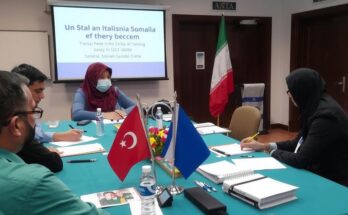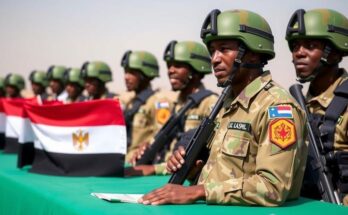Kenyan President William Ruto announced that he and Ugandan President Yoweri Museveni will mediate the dispute between Ethiopia and Somalia, which threatens regional stability. Key issues include Ethiopia’s military presence in Somalia and its plans related to Somaliland, which seeks international recognition. Previous negotiation attempts have failed, highlighting the complexities present in resolving the conflict.
In a recent announcement, Kenyan President William Ruto stated that he, alongside Ugandan President Yoweri Museveni, would facilitate mediation efforts aimed at resolving an escalating dispute between Ethiopia and Somalia. This conflict has raised concerns regarding the stability of the East African region, particularly due to Ethiopia’s military presence in Somalia, where its forces are engaged in combating al Qaeda-affiliated insurgents. The tension is particularly fueled by Ethiopia’s plan to develop a port in Somaliland, a breakaway region of Somalia seeking international recognition.
Somaliland has maintained a degree of self-governance and relative stability since declaring independence from Somalia in 1991, yet it continues to struggle for global acknowledgment. The ongoing discord has further strained relations between Somalia and Ethiopia, bringing Somalia closer to Egypt and Eritrea—both of which have historical grievances against Ethiopia. President Ruto emphasized the critical nature of securing Somalia’s stability for fostering an environment conducive to investment and economic growth in the region.
Previous mediation attempts, particularly those held in Ankara, Turkey, have not produced significant results, leaving the path toward reconciliation complicated. Efforts to secure comments from either the Ethiopian government or Somalia’s foreign minister were unsuccessful at the time of reporting, indicating a possible reluctance to engage publicly in the current negotiations.
The dispute between Ethiopia and Somalia has roots in both territorial and political complexities, particularly surrounding the status of Somaliland. The region declared independence from Somalia in 1991, yet it has not achieved official recognition from other nations or international bodies. Ethiopia has a significant military presence in Somalia, aimed at countering terrorism posed by groups such as al Shabaab, but its relationship with the Somali government has deteriorated due to conflicting interests regarding Somaliland’s aspirations for recognition. The conflict has broader regional implications, notably influencing Ethiopia’s relationships with neighboring countries like Egypt and Eritrea.
In conclusion, the mediation efforts led by Kenya and Uganda highlight the critical nature of regional cooperation in addressing the Ethiopia-Somalia dispute. The ongoing tensions, particularly regarding Somaliland’s recognition and Ethiopia’s military presence, underline the challenges faced in achieving sustained peace and stability in East Africa. The international community’s attention remains on these developments as regional leaders strive to forge a constructive dialogue.
Original Source: www.usnews.com




